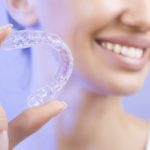
Jan 18, 2018
Are you embarrassed by your crooked teeth? Do you hate your smile because your teeth are not straight? Do you have trouble eating? Or bad oral hygiene because your crooked teeth don’t allow you to completely clean your teeth properly?
If you answered yes to any of these but don’t want to deal with braces at your age, you are lucky because there is another option.
Invisalign may be just the treatment you have been waiting for! Our aligners are easy to use and highly effective. They are comfortable and don’t seem to cause the mouth irritation that other methods can. You won’t have to worry about digging into your cheek.
The aligners are removable, making them easy to clean. Since you can remove them, you can also continue to practice good dental health by brushing and flossing without the trouble sometimes created by other methods of teeth straightening. Some of those other methods can require an extra half an hour to brush your teeth properly!
Also, Invisalign aligners are removable so you can eat whatever you want. You won’t have to dream about the day you get your braces off so you can enjoy corn on the cob! Even though they are clear and most people won’t even realize you are wearing them, you can still remove them for special occasions. Unless you tell them, nobody will ever know you are treating your mouth.

Jan 18, 2018
Your mouth, including your gums and teeth, is important to your overall health. However, many people don’t take proper care of their teeth. Without good home-care and routine dental visits, bacteria can build up and make you sick. It can even travel throughout your whole body, making you really ill.
In order to take good care of your mouth, you need to brush your teeth at least twice a day. It is important that you spend several minutes brushing your teeth. You want to do a thorough job instead of rushing it. It is also recommended that you change your toothbrush regularly.
Once you finish brushing, flossing is necessary to remove plaque and other things that build up between your teeth. Using a good antibacterial mouthwash will ensure your mouth stays healthy and free of (most) bacteria and germs.
Though you may not believe it, your diet is also important for a healthy mouth and teeth. You should stay away from sugar, sweets, and sodas, which can cause more cavities.
It is also very important to visit the dentist regularly to help you ensure your mouth and teeth stay healthy. During your visit you will get a professional cleaning to remove any additional plaque and tartar that are stuck to your teeth. We also can clean underneath the gums, reaching the areas you are unable to. During this time we will also do a thorough examination to check for any potential problems. It is our goal to fix them before they become even bigger ones. We may require x-rays to spot even more potential problems in your teeth.
Good dental health starts at home with proper brushing and flossing. An antibacterial mouthwash is also beneficial to help keep germs and bacteria at bay. However, nothing is better than a good professional cleaning. We also will check your mouth and teeth for any problems, either catching them early or monitoring any potential ones.

Jan 18, 2018
It is really important to take good care of your dentures. Not only do you want them to last a very long time, but also it is important for good dental health. Your mouth, gums, and remaining teeth need to stay healthy.
Here are some tips about how to take good care of your dentures:
Handle your dentures as little as possible and do so carefully. Do your best not to break them (or break them badly). Remove them only when you are standing over a sink or table so that if you do drop them, they don’t have as far to fall. You can even fill the sink full of water so that they will fall into the water instead of onto the table.
Clean your dentures regularly. Dentures need to be cleaned every day just like regular teeth. They are prone to getting food and plaque buildup. However, make sure you use denture cleaner and not toothpaste, which can damage dentures. Rinse your mouth after eating and in between brushing to keep your dentures clean.
Talk to your dentist about the proper care of your dentures when you are not wearing them. Most dentures need to be kept moist. This keeps them from drying out and losing their shape. However, not all dentures can be soaked, so it is important to discuss how best to care for your dentures with your dentist.
Dentures are a big investment, so you should do everything you can to make them last. You need to handle them as little as possible. It is also important to clean them regularly, just like you would with your regular teeth. You also need to know the best way to store your dentures when you are not wearing them. Some can be soaked while others can’t, so please discuss this with your dentist.

Jan 18, 2018
Periodontal disease is very common in adults. It is caused by the buildup of bacteria and plaque in our mouths. Without routine brushing and flossing, it continues to build up, forming tartar. Periodontal disease gets worse the longer it is left untreated.
The first sign of periodontal disease is red and swollen gums. Most people say their gums bleed easily, even when they are just brushing their teeth. Some have trouble eating because their teeth are so sensitive. They may start to lose teeth. Often people with periodontal disease have really bad breath.
Periodontal disease is diagnosed through an examination of your teeth. Dentists may also look further by probing your mouth, looking for trouble areas. An x-ray is a nice way to see the progression of the disease.
The treatment for periodontal disease depends on how far along the disease has progressed. It is always important to start with a good professional cleaning. This is necessary to remove the tartar from your mouth and underneath your gums. Your dentist may recommend that you use an antibacterial mouth rinse after you brush your teeth. Sometimes antibiotics are necessary to get rid of the disease.
Once your periodontal disease is under control, good home care with brushing and flossing should help to keep it from coming back. You may want to continue using an antibacterial mouth rinse to help with any bacteria that brushing may miss. It also will help give you minty fresh breath!
Routine examinations by your dentist will help to ensure you have a healthy smile of which you can be proud. Just because you get the disease under control does not mean it won’t come back. It is very important to get back in the habit of brushing your teeth and taking good care of your mouth so it can stay healthy.

Jan 18, 2018
Temporomandibular joint disease (TMD), a dysfunction of the temporomandibular joint (TMJ), is becoming more of a problem. The disorder causes pain and discomfort in the jaw joint and the muscles that move the jaw.
Many people have pain in their jaw and its muscles, though that does not always signify a problem. Most of the time the pain is temporary and goes away without any help from us.
However, sufferers of TMD have other symptoms. They may have pain in their jaw, face, and even their ears. Many suffer from headaches. Some people even experience pain in their neck and dizziness. Most people complain that they have trouble eating along with an uncomfortable bite.
Most of the time people are able to treat the symptoms by themselves at home. They may use over-the-counter pain relievers along with ice packs to help dull the pain. However, there are times when you need to see a dentist.
Dentists will do a thorough examination and then decide the best way to help you. Mouth guards, worn during sports (when you clench your jaw) or at night (when you grind your teeth), can be very helpful. There are times when surgery or implants may be necessary to help though.
If you are suffering from TMD or think you are, you should start by using pain relievers along with ice packs. If that is not helpful, you may want to contact your dentist and think about getting a mouth guard. You should try to do everything you can to protect your teeth. Plus you shouldn’t have to live in pain because of TMD.





